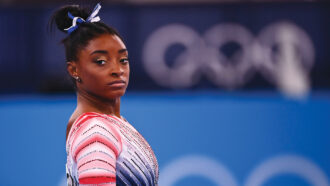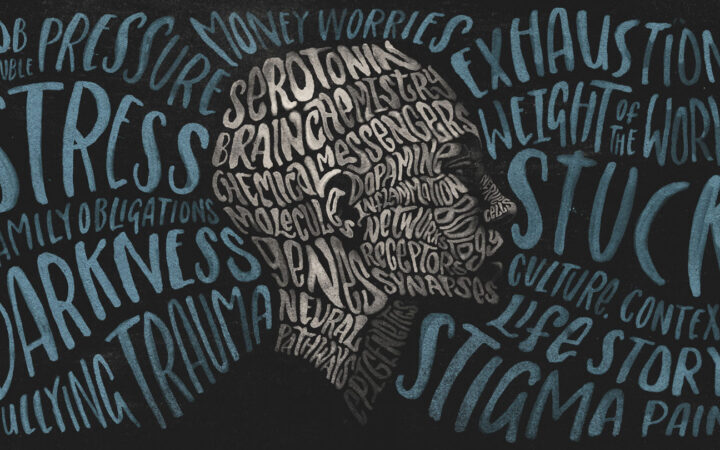
On yellow poster board, blue letters spell BELIEVE, a nod to the Emmy-winning TV show Ted Lasso. The sign hangs above psychologist Tommy Minkler’s office door at West Virginia University, a reminder to trust in the work he’s doing to help elite athletes.
In the show, Lasso, an American football coach, is recruited to head an English football team. His experience coaching American football, an utterly different game than soccer, leaves him lacking overseas, so he relies on his positive attitude and folksy charm to bond with his players. On his first day coaching, Lasso posts the BELIEVE sign above his office door. The team often rallies around the sign just before hitting the field.
But belief alone can’t get athletes to the goal when they run into the psychological speed bumps or full-on roadblocks that can arise during training and competition. When Lasso’s striker Dani Rojas faced the yips — suddenly unable to nail his usually flawless penalty kicks — a therapist was called in. In real life, when the twisties hit U.S. gymnast Simone Biles at last summer’s Olympics in Tokyo, she withdrew from five of six event finals. Biles’ mental block was petrifying; one wrong move on the uneven bars or a failed flip on the balance beam could cause a devastating injury, or even death. Her decision to withdraw from competition after years of intense training shocked the world, from commentators to armchair athletes.
Elite athletes are expected to be unflappable. Admitting vulnerability is “so fundamentally at odds with being a competitor,” retired U.S. figure skater Sasha Cohen, who won a silver medal at the 2006 Winter Olympics, explained in the 2020 HBO documentary The Weight of Gold. Sport is war. Competing at the elite level requires strategy and posturing. “You need to show the world you are strong. You need to show your competitors you are strong,” Cohen said. “If you were to say, ‘Oh, I have mental health issues,’ that just cracks the facade.”
In society, those cracks are often seen as weakness, a faulty perception that prevents athletes from talking about their problems. That stigma is, in fact, the strongest barrier to athletes seeking help, says psychiatrist João Mauricio Castaldelli-Maia of the University of São Paulo. He and colleagues reviewed 52 studies on mental health and elite athletes in the British Journal of Sports Medicine in 2019.
Reactions to Biles’ decision made clear that the stigma still exists. She faced backlash after withdrawing from several Olympics events, as did Japanese tennis star Naomi Osaka, who pulled out of the 2021 French Open to focus on her mental health. But amid the vitriol, Biles and Osaka had supporters, including fellow athletes who were inspired by these choices. “I didn’t even know that was an option,” U.S. figure skater Nathan Chen, a medal favorite at the upcoming Winter Olympics, said of Biles’ decision, at an October news briefing.
U.S. figure skater Nathan Chen, preparing to compete in the 2022 Winter Olympics in Beijing, says he was inspired by Biles’ actions at the Summer Olympics, stating: “We are important as people, not just athletes.”Tim Nwachukwu/Getty Images plus
The International Olympic Committee, the U.S. Olympic & Paralympic Committee and other sports organizations have begun to acknowledge the importance of mental health. Just because elite athletes are at peak physical fitness, their mental fitness is not guaranteed. Since 2018, sports-governing agencies, including the IOC, and health organizations have released a rash of position statements on the mental health symptoms, such as anxiety, depression and eating disorders, that are common among elite athletes, the factors contributing to those symptoms and the psychological tools that might help competitors on and off the field.
There’s also been an explosion of research into elite athletes’ mental health in the last few years, says sports and clinical psychologist Carolina Lundqvist of Linköping University in Sweden, citing a 2020 analysis in International Review of Sport and Exercise Psychology. The research points to two promising psychological tools.
One is mindfulness — paying attention to, or staying in, the present moment without judgment. Another is acceptance and commitment therapy, or ACT. In conjunction with mindfulness, the therapy trains a person to accept difficult thoughts or feelings rather than actively work to get rid of them. Studies have shown that these tools can improve athletic performance — and, importantly, lead to a richer life off the ice or the court.
Athletes “are human beings first,” says Minkler, the Ted Lasso enthusiast. Their life is not all about winning medals or championships. Mindfulness and ACT help athletes “learn more about themselves and engage differently with their thoughts and emotions,” he says. It teaches them to be better people.
Team tests
On the women’s lacrosse field at Marymount University in Arlington, Va., players toss the ball with an intense focus on their grip of the lacrosse stick, the snap of their wrists and the weight of the ball as they catch it and pass it on. To an outsider, the drills might seem routine, but the women were paying extra attention to the task. The focused attention is a result of experiments that Minkler (a former lacrosse coach), Washington, D.C.–based psychologist Tim Pineau and colleagues have run with the team in the last few years.
The researchers wanted to know if mindfulness training could improve player performance and overall well-being. With buy-in from the school’s athletic director and lacrosse coach, Pineau led the players through six weeks of mindfulness training during preseason, then monthly follow-ups over several seasons.
The mindfulness sessions started with stationary meditations focusing on breathing and self-compassion, then progressed to mindful yoga and walking, and finally to throwing and catching exercises. Along with the meditative work, the players talked about what they’d learned in group discussions, describing how they used the training to let go of mistakes. The coach reported that the players were more focused on the second-to-second decisions of the game, rather than dwelling on something that had gone wrong.
In post-training surveys, players reported feeling that they could slip into that state of being totally immersed in the game, what is often called a flow state or being in the zone, much more easily after the mindfulness training. And they said they were less anxious about playing lacrosse. Before training, the team had four wins and 15 losses. In the season after the training, the team won more games than it lost and qualified for the regional conference championship. The next season, the team won the regional conference championship, the researchers reported in 2019 in the Journal of Sport Psychology in Action.
The women’s lacrosse team at Marymount University used mindfulness with stationary meditation, yoga and throwing and catching exercises over several seasons. Players’ anxiety levels dropped and the team started winning more games than it lost.David Sinclair photo
The findings reinforce results from a mindfulness study with the University of Miami football team, the Hurricanes. Amishi Jha, a neuroscientist at the university, teamed with Hurricanes head coach, Al Golden, and his players to track how well they paid attention during preseason training. Jha and her colleagues measured the players’ focus in the lab by having them hit the space bar on a keyboard when they saw certain numbers on a computer screen, such as 2 or 4. Players were told not to hit the bar when they saw other numbers, like 3. The stronger their attention, the better players were at not hitting the space bar when the number 3 flashed across the screen.
After measuring baseline attention of the players, the researchers divided the players into two groups: one worked through a four-week training with mindfulness meditations, while the other received four weeks of relaxation exercises. Mindfulness exercises focused on bringing attention back to the present moment whenever the mind strayed; relaxation exercises focused on relieving tension, without focusing cues.
In previous experiments with emergency medical and military professionals, Jha had found that high stress, poor mood and perceived threats can disrupt focus. In this study, she had the Miami players complete their mindfulness or relaxation work during preseason training, the grueling physical workouts that help coaches decide who gets cut from the team.
When given the computer attention test after preseason training ended, the players didn’t focus as well as before. And they reported being more anxious, more depressed and less happy overall, a result of being stressed from the physicality of football training, Jha says.
Although their focus declined in the high-stress setting, the attention of players who regularly practiced mindfulness exercises dropped less drastically than those who regularly practiced relaxation exercises, Jha and colleagues reported in the Journal of Cognitive Enhancement in 2017.
“Attention is the fuel for our ability to not just think and do cognitively demanding tasks, but to regulate our emotion and connect” with other people, Jha says. Protecting the ability to pay attention can protect mental health, she explains in her 2021 book Peak Mind, which explains how to build mental “muscles” in as little as 12 minutes a day.
Learned discipline
Meditative trainings are like a push-up for the mind. It takes practice, Minkler says. “You can’t meditate once for 10 minutes and say, ‘I’m mindful and in the present,’ just like you wouldn’t go in the weight room and do five push-ups and say, “That’s it, that’s all I need to do,’ ” he says. “You have to work at it. You have to be disciplined.”
Graham Mertz, quarterback for the University of Wisconsin–Madison, has said he’s seen results with mindfulness training. After what he felt was a disappointing season in 2020, Mertz began working with the Wisconsin Badgers’ director of meditation training, Chad McGehee. That training helped Mertz figure out how to reset himself mentally between a game’s offensive plays, he told the Wisconsin State Journal. There’s roughly 40 seconds between plays, and Mertz says he spent a lot of time identifying “anchors” to bring his attention back to the moment and leave the play that just happened in the past.
The best approach he found was to take a deep breath, close his eyes and rub his fingertips together. The Badgers finished the 2021 season with eight wins and four losses, plus a win in December’s Las Vegas Bowl.
Mertz’s story, while just one person’s experience, supports Minkler’s and Jha’s findings, which suggest mindfulness could be an essential tool that athletes should pack in their bags for game day. But the work comes with caveats. Analyses have shown that mindfulness researchers tend to overreport positive findings. And for some people, studies suggest, focused breathing and other mindfulness exercises can bring up past trauma, causing distress, Minkler says. Having clinical psychologists on hand to work with athletes who have this reaction to mindfulness training is important.
During its 2014 season, the University of Miami Hurricanes football team tested mindfulness and relaxation to improve attention and emotional well-being.Doug Murray/Icon Sportswire/Corbis/Icon Sportswire via Getty Images
No judgments
Acceptance and commitment therapy, or ACT, is another technique counselors are using to help athletes improve not only their performance but their overall mental health. The goal of ACT is to teach athletes to separate their competitor identity from their personal one.
ACT does not attempt to change negative thoughts, such as “I suck today,” but to acknowledge the thought as something completely independent of who or how talented the athlete is. By accepting the negative thought, rather than getting stuck in a downward spiral of trying to combat it with counterarguments, an athlete can bring her focus back to the race or game at hand.
For a triathlete, who can spend up to 17 hours swimming, biking and running in a race, letting go of the detrimental self-talk can be extremely important when a competitor moves in front, or when the race is long and an athlete wants to give up, says Eugene Koh Boon Yau, a psychiatrist at the University of Putra Malaysia in Seri Kembangan. In the last few years, Yau worked with three triathletes competing to represent Malaysia at international competitions. All three struggled with self-doubt.
Over six weeks, he walked each athlete through a mental training on mindfulness so each learned to notice and label their thoughts and emotions, especially negative ones, and then accept those thoughts without judgment. Then each athlete identified his values and what he wanted to be remembered for, should his career end the next day. Yau and each athlete then discussed how to use mindfulness and thought acceptance during a race to stay focused on performance without getting wrapped up in what competitors were doing.
The training “does help me with reducing anxiety and overthinking,” says triathlete Edwin Thiang, who worked with Yau. Thiang says he’s still surprised by how vital the training is, especially in high-stakes races. It calms him down and helps him stay focused.
The other athletes who worked with Yau agree. One triathlete said he found it easier to accept thoughts of self-doubt when a competitor overtook him. Before the mental training, the athlete would slow down in such situations, giving up hope of finishing high in the rankings. After the training, he identified his self-doubt as an emotion, not a reality. By shifting his attention back to the mechanics of either swimming, biking or running, he could keep the pace he set for himself during the race. Another of the triathletes reported that the training helped him stay committed to physical training, Yau and colleagues reported in the May 2021 Journal of Sport Psychology in Action.
Those results align with a study that pitted mindfulness and elements of ACT against some of the traditional, performance-focused psychological tools athletes have been taught for decades, such as visualization, relaxation (similar to what was used in Jha’s study) and positive self-talk. In that experiment, 18 women’s basketball players at a Division III university in New Jersey were divided into two groups. One worked through relaxation and stress management exercises developed by psychologist Richard Suinn and described in the 1986 book Seven Steps to Peak Performance. The other group worked through exercises for mindfulness and acceptance of thoughts described in the 2007 book The Psychology of Enhancing Human Performance: The Mindfulness-Acceptance-Commitment (MAC) Approach by psychologists Frank Gardner and Zella Moore.
A month after the study ended, MAC-trained players had dips in anxiety, substance use, eating issues and overall psychological distress, along with gains in emotional regulation. Players trained in traditional psychological skills had less improvement in those areas, Princeton University psychologist Mike Gross and colleagues reported in 2018 in the International Journal of Sport and Exercise Psychology.
On the court, mindfulness paired with elements of ACT can quickly keep players moving and help them stay in the game, especially if they make a mistake, Gross says. “There’s less … of those mental gymnastics or the tug-of-war in the mind” that can mess up a player even more. In fact, the MAC-trained players, he says, were less likely to get extremely upset or sad and were better able to cope with changes and try creative approaches to tasks than the players trained with traditional sports psychology tools.
Extending that idea further, Minkler argues that performance problems rarely have anything to do with technical skills. Mental hang-ups in training and competition are often related to interpersonal issues, like relationships with teammates, coaches or loved ones. Mindfulness and ACT can help athletes work through those issues to bring their focus back to their sport, he says.
Mertz, the Wisconsin quarterback, would agree. He said he began to realize during his mindfulness training that he was focused so intently on football, he was neglecting the other parts of his life. He learned to pay attention to what he needed to do for his mental health, whether it was focus a bit more on prepping for the season or just taking some time to have fun. His overall mental health improved as a result, he said.
Researchers using these techniques say they’ve seen similar off-the-field benefits for their student athletes, including improved focus on readings for class and better communication with friends and family. With those results in mind, Jha say she’d like to test how mindfulness and ACT training might work for Olympic teams.
She has, in fact, had several briefings with U.S. and Australian Olympic team representatives about her mindfulness training. Ideally, she says, she would train Olympic coaches to work with their athletes, and then track the competitors’ performance and psychological health and attention. That kind of study is even more relevant after last year’s very public experiences of athletes such as Biles and Osaka, she says.
“These people we see as pillars of excellence [are experiencing] extremely dysfunctional mental states,” Jha says. “How do we have the mental fitness match the physical excellence?” Studies on mindfulness and ACT hint that a match-up is achievable, and the training might benefit not only elite athletes but every one of us.
“Athletes at the elite level are aspirational,” Jha says. They show us that physical training is necessary for physical health, and they’ve reminded us more recently that the mind, like the body, “needs training to stay fit,” she says, “and we can train it.”

 A new treatment could restore some mobility in people paralyzed by strokes
A new treatment could restore some mobility in people paralyzed by strokes  What has Perseverance found in two years on Mars?
What has Perseverance found in two years on Mars?  This robot automatically tucks its limbs to squeeze through spaces
This robot automatically tucks its limbs to squeeze through spaces  Greta Thunberg’s new book urges the world to take climate action now
Greta Thunberg’s new book urges the world to take climate action now  Glassy eyes may help young crustaceans hide from predators in plain sight
Glassy eyes may help young crustaceans hide from predators in plain sight  A chemical imbalance doesn’t explain depression. So what does?
A chemical imbalance doesn’t explain depression. So what does?